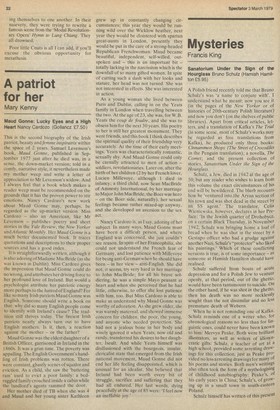A patriot for her
Mary Kenny
Maud Gonne: Lucky Eyes and a High Heart Nancy Cardozo (Gollancz £7.50) This is the second biography of the Irish patriot, beauty and femme inspiratrix within the space of 2 years. Samuel Levenson's book, Maud Gonne, published in September 1977 just after he died was, in a sense, the down-market version; told in a comfy, narrative style, it nevertheless made my mother weep and write a letter of appreciation to Mr Levenson's widow. And I always feel that a book which makes a reader weep must be recommended on the grounds that it has the proven power to stir emotions. Nancy Cardozo's new work about Maud Gonne may, perhaps, be regarded as the up-market version. Miss Cardozo — also an American, like Mr Levenson — publishes poetry and short stories in the Yale Review, the New Yorker andA tlantic Monthly. Her Maud Gonne is a much better documented book. It traces quotations and descriptions to their proper sources and has a good index.
It is straightforwardly written, although it is also adoring of Madame MacBride (as she was known in Dublin). Miss Cardozo gives the impression that Maud Gonne could do no wrong, and attributes her driving force to her profound love of Ireland. But would a psychologist attribute her patriotic energy more perhaps to the hatred of England? For like so many Irish patriots Maud Gonne was English. Someone should write a book on that: why did so many English people come to identify with Ireland's cause? The tradition still thrives today. The fireiest Irish patriots nearly always turn out to have English mothers. Is it, then, a reaction against the mother — or the father?
Maud Gonne was the eldest daughter of a British Officer, garrisoned in Ireland in the 1860s. It was a grim time. The poverty was appalling. The English Government's handling of Irish problems was rotten. There were constant, ghastly scenes of squalor and eviction. As a child, she saw the 'battering ram' used to evict a poor family: a bedraggled family crouched inside a cabin while the landlord's agents rammed the door.
Her mother died of TB when she was 4 and Maud and her young sister Kathleen grew up in constantly changing circumstances; this year they would be running wild over the Wicklow heather, next year they would be cloistered with spartan great-aunts in London, presently they would be put in the care of a strong-headed Republican Frenchwoman. Maud became beautiful, independent, self-willed, outspoken and — this is an important bit — totally lacking in the narcissism which is the downfall of so many gifted women. In spite of cutting such a dash with her looks and stature, her head was not turned. She was not interested in effects. She was interested in action.
As a young woman she lived between Paris and Dublin, calling in on the Yeats family in London when travelling between the two. At the age of 23, she was, for W.B. Yeats the coup de foudre, and she was to obsess him for the next 30 years. His poetry to her is still her greatest monument. They were friends, and this book I think describes the spiritual quality of their friendship very accurately. At the time of their early meetings, Yeats was characteristically romantic, sexually shy. And Maud Gonne could only be carnally attracted to men of action — soldiers, revolutionaries. Later on, after the birth of her children (2 by her French lover, Lucien Millevoye, although 1 died in infancy; a third child, now Sean MacBride of Amnesty International, by her marriage to Major John MacBride, the Boer war hero — on the Boer side, naturally), her sexual feelings became rather mixed-up anyway, and she developed an aversion to the sex act.
Nancy Cardozo is, as I say, adoring of her subject. In many ways, Maud Gonne must have been a difficult person, and where England was concerned, she just couldn't see reason. In spite of her Francophilia, she could not understand the French fear of Germany, and lost patience with Millevoye for being anti-German when he should have been — in her view — anti-English. She did not, it seems, try very hard in her marriage to John MacBride; for all his brave soldiering, he was a simple Mayo peasant at heart and when she perceived that he had little, otherwise, to offer she lost patience with him, too. But Miss Cardozo is able to make us understand why Maud Gonne was worthy of adoration. As she grew older, she was warmly maternal, and showed immense concern for children, the poor, the young, and anyone who needed protection. She had not a jealous bone in her body and wisely ignored it when Yeats, now old and randy, transferred his desires to her daughter, Iseult. And while Yeats himself was disillusioned with the bourgeois, insular, clericalist state that emerged from the Irish national movement, Maud Gonne did not end her life feeling disappointed, which is unusual for an idealist. She believed that Ireland had been worth every bit of struggle, sacrifice and suffering that they had all endured. Her last words, dying peacefully at the age of 85 were: 'I feel now an ineffable joy.'


































 Previous page
Previous page